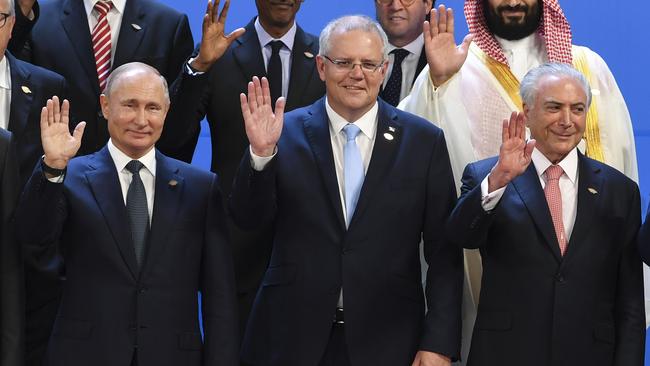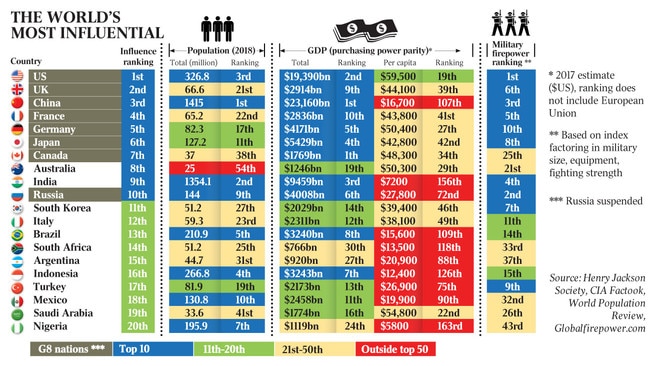Australia deserves a place in the G8, study finds
Australia is one of the 10 most powerful nations in the world, more so than Russia, a study has found.

Australia is one of the 10 most powerful nations in the world and deserves a place in the G8, an audit of geopolitical capability has found.
The Henry Jackson Society in Britain says Australia is even more politically powerful than Russia because it is a “hemispheric power’’ capable of projecting itself and defending its own interests within the southern hemisphere. The study has found that Russia, however, is only a regional power.
The detailed study ranked Australia in eighth place across categories of capability, national base, its structure, instruments and resolve.
The US headed the rankings with Britain ahead of China, France and Germany. Japan was in sixth position followed by Canada and Australia.
They were then followed by India and Russia.
James Rogers, the study’s chief analyst, said: “Russia’s decline and Australia’s rise are now so pronounced that there is a prima facie case for Australia to join the G8, taking the seat that Russia has lost.”
He added: ‘’Australia’s burgeoning economy and strengthened military have also helped secure its position as a major world player. The purchase of the new Type 26 frigates is only likely to boost Australia’s standing still further.
‘’Australia has profited from its links to the so-called Anglosphere. Further investment in institutions like the Five Eyes (intelligence sharing arrangement) could help Australia rise higher still.”

The audit, which concentrated on the G20 nations, plus Nigeria, measured 33 indicators and 1240 pieces of data to assess a nation’s capability. It used a complicated mathematical formula to weight the data. Indicators included military might, national resolve, cultural prestige, diplomatic leverage, technological prowess and national base. The indicators delved into aspects as varied as the national income, top universities, tourist arrivals, press freedom, national food brands, sporting success, overseas missions and defence spending.
It is not a ranking of a country’s war-fighting capacity, but rather looks at the geopolitical interactions and circumstances as countries jockey for influence.
Mr Rogers told The Weekend Australian that Australia figured much better than Russia across a range of different matrix indicators, particularly in the way the country could bring about change in other nations in a way that was beneficial to Australia.
‘’Australia’s priority on cultural power — its ability to attract others to your cause, its narrative to shape and influence global discourse or ideas and ideology — ranks it fourth in the world,’’ Mr Rogers said.
Australia’s membership of the intelligence group Five Eyes alongside the US, Canada, New Zealand and Britain helped boost Australia’s score.
“Other English-speaking countries perform strongly for this (cultural) pillar, reflecting their high levels of freedom and creativity, which contributes to their political resilience and durability,’’ Mr Rogers said.
‘’Indeed, the cultural indicators — particularly discursive dominance — reveal that they have a strong hold over the primary means of global communication and may even be intersecting with one another to further entrench their lead.’’
Mr Rogers said Australia scored sixth in the “national base’’, which assessed the resources the country had available and seventh in how those resources were implemented.






